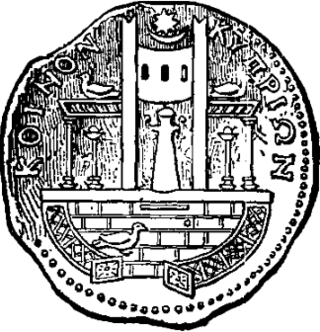Related Research Articles

Lemnos or Limnos is a Greek island in the northern Aegean Sea. Administratively the island forms a separate municipality within the Lemnos regional unit, which is part of the North Aegean region. The principal town of the island and seat of the municipality is Myrina. At 477.583 square kilometres (184.396 sq mi), it is the 8th-largest island of Greece.

The Corn Laws were tariffs and other trade restrictions on imported food and corn enforced in the United Kingdom between 1815 and 1846. The word corn in British English denoted all cereal grains, including wheat, oats and barley. They were designed to keep corn prices high to favour domestic producers, and represented British mercantilism. The Corn Laws blocked the import of cheap corn, initially by simply forbidding importation below a set price, and later by imposing steep import duties, making it too expensive to import it from abroad, even when food supplies were short. The House of Commons passed the corn law bill on 10 March 1815, the House of Lords on 20 March and the bill received royal assent on 23 March 1815.

A grain is a unit of measurement of mass, and in the troy weight, avoirdupois, and apothecaries' systems, equal to exactly 64.79891 milligrams. It is nominally based upon the mass of a single ideal seed of a cereal. From the Bronze Age into the Renaissance, the average masses of wheat and barley grains were part of the legal definitions of units of mass. Expressions such as "thirty-two grains of wheat, taken from the middle of the ear" appear to have been ritualistic formulas. Another source states that it was defined such that 252.458 units would balance 1 cubic inch (16 cm3) of distilled water at an ambient air-water pressure and temperature of 30 inches of mercury (100 kPa) and 62 °F (17 °C) respectively. Another book states that Captain Henry Kater, of the British Standards Commission, arrived at this value experimentally.
The naval Battle of Cynossema took place in 411 BC during the Second Peloponnesian War. In the battle, an Athenian fleet commanded by Thrasybulus and Thrasyllus, although initially thrown on the defensive by a numerically superior Spartan fleet, won a narrow victory. This victory had an impact out of proportion to its tactical significance, coming when Athens' traditional democratic government had been replaced by an oligarchy and an Athenian defeat could have ended the war. The newly confident Athenian fleet proceeded to win two more victories in the Hellespont in quick succession, the second being the dramatic rout at Cyzicus, which ended the immediate Spartan threat to Athens' Black Sea lifeline.

The Canadian Wheat Board was a marketing board for wheat and barley in Western Canada. Established by the Parliament of Canada on 5 July 1935, its operation was governed by the Canadian Wheat Board Act as a mandatory producer marketing system for wheat and barley in Alberta, Saskatchewan, Manitoba, and a small part of British Columbia. It was illegal for any farmer in areas under the CWB's jurisdiction to sell their wheat and barley through any other channel than the CWB. Although often called a monopoly, it was actually a monopsony since it was the only buyer of wheat and barley. It was a marketing agency acting on behalf of Western Canadian farmers, passing all profits from its operation back to farmers. Its market power over wheat and barley marketing was referred to as the "Single Desk".

Imbros, officially Gökçeada since 29 July 1970, is the largest island of Turkey, located in Çanakkale Province. It is located in the north-northeastern Aegean Sea, at the entrance of Saros Bay, and has the westernmost point of Turkey. Imbros has an area of 286.8 km2 (110.7 sq mi), and has some wooded areas.

In brewing, adjuncts are unmalted grains or grain products used in brewing beer which supplement the main mash ingredient. This is often done with the intention of cutting costs, but sometimes also to create an additional feature, such as better foam retention, flavours or nutritional value or additives. Both solid and liquid adjuncts are commonly used.

First Fruits is a religious offering of the first agricultural produce of the harvest. In classical Greek, Roman, and Hebrew religions, the first fruits were given to priests as an offering to deity.
Heliaia or Heliaea was the supreme court of ancient Athens. The view generally held among scholars is that the court drew its name from the ancient Greek verb ἡλιάζεσθαι, which means congregate. Another version is that the court took its name from the fact that the hearings were taking place outdoors, under the sun. Initially, this was the name of the place where the hearings were convoked, but later this appellation included the court as well.
The Assize of Bread and Ale was a 13th-century law in high medieval England, which regulated the price, weight and quality of the bread and beer manufactured and sold in towns, villages and hamlets. It was the first law in British history to regulate the production and sale of food. At the local level, this resulted in regulatory licensing systems, with arbitrary recurring fees, and fines and punishments for lawbreakers. In rural areas, the statute was enforced by manorial lords, who held tri-weekly court sessions.

The Second Athenian League was a maritime confederation of Greek city-states that existed from 378 to 355 BC under the leadership (hegemony) of Athens. The alliance represented a partial revival of the Delian League, which had been disbanded in 404 BC following the defeat of Athens in the Peloponnesian War. The new League was centered in the Aegean and included over 60 states, among which were Kos, Mytilene, Rhodes, and Byzantium. It was primarily formed as a defensive alliance against Sparta and secondly the Persian Empire. The new League's main objective was to preserve peace in Greece and counterbalance Sparta's growing hegemony and aggression. The League largely revived Athenian influence in the Greek world, reestablishing it as the strongest naval power in the eastern Mediterranean. This time, Athens made conscious efforts to avoid the strict terms that had eventually rendered the previous Delian League unpopular. The alliance lasted until 355 BC, when most of the allied cities became independent following the Social War that broke out in 357 BC.

Barley, a member of the grass family, is a major cereal grain grown in temperate climates globally. It was one of the first cultivated grains; it was domesticated in the Fertile Crescent around 9000 BC, giving it nonshattering spikelets and making it much easier to harvest. Its use then spread throughout Eurasia by 2000 BC. Barley prefers relatively low temperatures to grow, and well-drained soil. It is relatively tolerant of drought and soil salinity, but is less winter-hardy than wheat or rye.
The hobbit is a unit of volume or weight formerly used in Wales for trade in grain and other staples. It was equal to two and a half bushels, but was also often used as a unit of weight, which varied depending on the material being measured. The hobbit remained in customary use in markets in northern Wales after Parliament standardized the Winchester bushel as the unit of measure for grain, after which courts gave inconsistent rulings as to its legal status.

Koinon, meaning "common thing", in the sense of "public", had many applications, some societal, some governmental. An abstract noun formed from the neuter of the adjective, koinos, "common", the koinon could mean any sort of organization. It had more than one meaning in the governmental sense.

The members of the Delian League/Athenian Empire can be categorized into two groups: the allied states (symmachoi) reported in the stone tablets of the Athenian tribute lists, who contributed the symmachikos phoros in money, and further allies, reported either in epigraphy or historiography, whose contribution consisted of ships, wood, grain, and military assistance; proper and occasional members, subject members and genuine allies.

A grain is a small, hard, dry fruit (caryopsis) – with or without an attached hull layer – harvested for human or animal consumption. A grain crop is a grain-producing plant. The two main types of commercial grain crops are cereals and legumes.
A medimnos was an Ancient Greek unit of volume, which was generally used to measure dry food grain. In Attica, it was approximately equal to 51.84 litres, although this volume was frequently subject to regional variation. For example, the Spartan medimnos was approximately equal to 71.16 litres. A medimnos could be divided into several smaller units: the tritaios, the hekteus, the hemiektos, the choinix and the kotyle
The symmoria was a group of wealthy citizens in Classical Athens during the 4th century BC, assessed together for the purposes of taxation.

Athenian democracy developed around the 6th century BC in the Greek city-state of Athens, comprising the city of Athens and the surrounding territory of Attica. Although Athens is the most famous ancient Greek democratic city-state, it was not the only one, nor was it the first; multiple other city-states adopted similar democratic constitutions before Athens. By the late 4th century BC, as many as half of the over one thousand existing Greek cities might have been democracies. Athens practiced a political system of legislation and executive bills. Participation was open to adult, free male citizens The metics probably constituted no more than 30 percent of the total adult population.

The 1766 food riots took place across England in response to rises in the prices of wheat and other cereals following a series of poor harvests. Riots were sparked by the first largescale exports of grain in August and peaked in September–October. Around 131 riots were recorded, though many were relatively non-violent. In many cases traders and farmers were forced by the rioters to sell their wares at lower rates. In some instances, violence occurred with shops and warehouses looted and mills destroyed. There were riots in many towns and villages across the country but particularly in the South West and the Midlands, which included the Nottingham cheese riot.